Best Cheap European Cities to Live in 2020
Because why should London, Paris or Stockholm get all the hype?

If you could live anywhere in the world, where would you go? Many of us dream of expat life, harbouring fantasies of a year abroad, a retirement in warmer climates, or returning to that city which you fell in love with as a student.
Certain cities definitely receive more hype than others on the list of top destinations. London, Paris, NYC. Yet with ever-rising rent and living costs, not to mention stiff competition for jobs and apartments as thousands flock to the big city, perhaps it's time to look at the oft overlooked gems which Europe has to offer?
Tallinn, Estonia
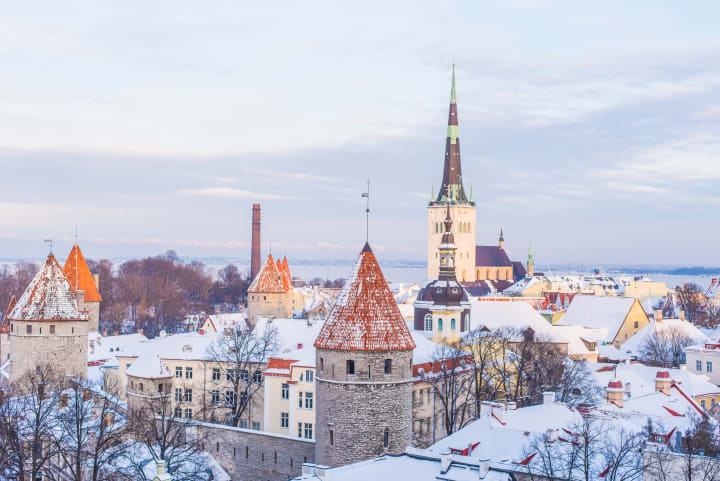
Establishing itself as a haven for digital nomads, Estonia is the perfect destination for freelancers, entrepreneurs, artists, designers, photographers and writers. Tech is another huge sector in the country, and the country's education system actively encourages entrepreneurship, especially in tech and internet. National minimum wage is very low, at just €584 per month, but with equally low living costs, it's a very affordable country for someone whose freelance works stems from clients based in cities such as London. Furthermore, it's one of the easiest countries in which to establish a business, with an entirely paperless system; Estonia was the first country in the world to introduce e-residency.
Estonia is ranked (as of 2019) 11th in the world for family life, and boasts an excellent and affordable education system. If you're used to warmer weather, than climate can take some adjustment, with very cold, snowy winters and mild summers. For the sporty, hiking and wild camping are legal across the country, and it's a huge part of the culture to take off for a day of trekking, cycling and sleeping under the stars. For culture-lovers, Tallinn's old town is UNESCO protected, brimming with stunning architecture, a burgeoning foodie scene, and a rich music scene, including several festivals each year.
Public transport is excellent and free for residents, and personally, one of my favourite things about Estonia is that, being only 80km from Finland, a ferry ride from Tallinn to Helsinki takes just two hours, and a one way ferry ride for a foot passenger costs as little as €10.
Monthly minimum wage: €584
Average monthly net salary (after tax): €
Average monthly rent (1 bedroom, central apartment): €
Price of property per square metre: €
Average basic monthly utility bills: €
Public transport (one way ticket): Free for residents. Otherwise €
Price of a loaf of bread: €
Price of a litre of milk: €
Price of a half litre of beer: €
Tbilisi, Georgia
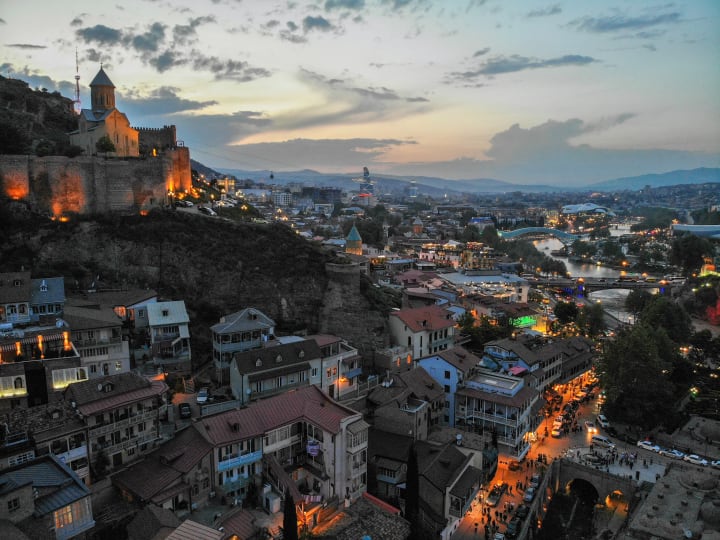
Georgia is another country of which little was heard on the expat-scene, but is rapidly increasing in popularity. Described by the locals as the 'balcony of Europe', Georgia sits on the boundary between Europe and Asia, bordering Turkey, Armenia, Azerbaijan, and Russia, and with a western coastline to the Black Sea. The rich medley of neighbouring cultures is a heavy influence, particularly in the capital, Tbilisi.
For nature lovers, Georgia can claim its stake as being home to Europe's highest peak; Mount Elbrus (standing at 5,642m). In fact, the country's Caucasian Mountain range, easily accessible from Tbilisi, boasts no less than seven mountains of 5,000m in height or more.
Mining and agriculture are two of the largest sectors in the country, but the economy is heavily supported by an ever-growing tourist and service industries, and many expats work as freelancers and English teachers. Meanwhile, living costs are extremely affordable.
The visa situation has been a little murky since changes were made in 2014, and can be confusing at first. Tourists, freelancers working in Georgia, journalists, and those attending meetings and conferences are, as of 2014, free to do so on a tourist visa. However, in order to become an employee in Georgia, establish a business, or provide paid services to a Georgian company, you must obtain on a long-term visa. A long-term visa is also required in order to obtain a residency permit.
Monthly minimum wage: 20 lari/€7 (yes... really!)
Average monthly net salary (after tax): 795.31 lari/€248.85
Average monthly rent (1 bedroom, central apartment): 1,002.70 lari/€313.74
Price of property per square metre: 3,128.15 lari/€978.80
Average basic monthly utility bills: 171.85 lari/€53.77
Public transport (one way ticket): 0.50 lari/€0.16
Price of a loaf of bread: 0.93 lari/€0.29
Price of a litre of milk: 3.10 lari/€0.97
Price of a half litre of beer: 3 lari/€0.94
Wroclaw, Poland
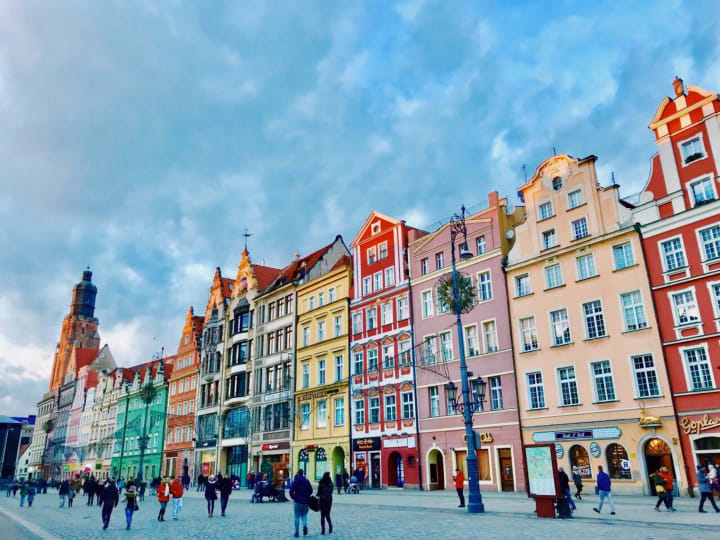
With its vibrant, colourful and oh-so-instagrammable architecture, is it any wonder that Wroclaw is considered a must-visit city for well-travelled wanderer? But Wroclaw has so much more to offer than simply a picture-perfect holiday.
One of Poland's most rapidly developing city, Wroclaw's strengths lie particularly in academia and business, making Wroclaw a haven for students, young professionals and freelancers.
Dozens of galleries, theatres, cinemas (films are often shown in their original language) and a number of festivals per year will keep culture-lovers entertained, not to mention that Wroclaw was named UNESCO Capital of Culture 2016, UNESCO Book Capital 2017 and UNESCO City of Literature 2019, while the city also boasts a diverse, ever-growing foodie scene.
Being the fourth largest city in the country (and yet, the second wealthiest), living costs in Wroclaw are lower than capital city Warsaw or the more touristic Krakow, with a one bedroom apartment in central Wroclaw averaging about 2,211.54 zł per month (about €517). However, this being a bustling student city, demand is high and it can be difficult during late summer and autumn especially to find an apartment, and, as with all in-demand cities, rent is steadily rising. Many expats work as freelancers, but education, tech and IT are also common industries for employment, with several international companies located in the Wrocław Technology Park. With many big companies looking for skilled, bilingual staff, plenty of career opportunities await anyone willing to make Wroclaw their home.
Monthly minimum wage: 2,600 zł/€604
Average monthly net salary (after tax): 3,622.95 zł/€842.97
Average monthly rent (1 bedroom, central apartment): 2,211.54 zł/€514.57
Price of property per square metre: 9,314.29 zł/€2,167.19
Average basic monthly utility bills: 677.08 zł/€157.54
Public transport (one way ticket): 3.40 zł/€0.79
Price of a loaf of bread: 3.18 zł/€0.74
Price of a litre of milk: 2.38 zł/€0.55
Price of a half litre of beer: 8.00 zł/€1.86
Lisbon, Portugal
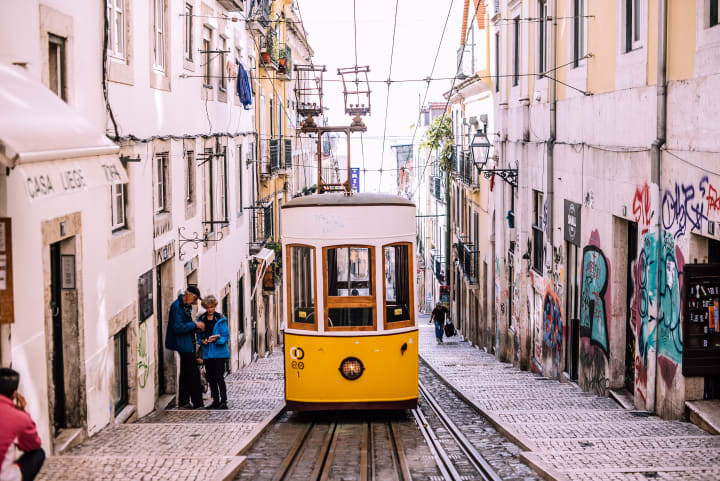
With beautiful architecture, a rich culture, year-round sunshine and a proximity to the coast, it's no wonder that thousands flock (tourist and expats alike) to Portugal's capital city.
As is the case in many cheap cities across Europe, the most common career choice in Lisbon for expats is freelancing, as the national minimum wage currently stands at just €675 per month. Nevertheless, Lisbon is one of the leading startup capitals in the world, especially in the high-tech sector. With a system in place heavily supportive of entrepreneurs, including appropriate legislation, affordable office space and highly qualified, bilingual business advisors, this is an excellent place to work freelance. With the city's very low living costs, maintaining a London/Paris/NYC-level income by working with clients and businesses based abroad can make for a very comfortable lifestyle.
Perhaps one thing to note before leaping into expat life in Lisbon is that while there is ever an abundance of housing for sale, for a fraction of the price of the average house in the UK, there is comparatively very little rental accommodation, and so this may perhaps be a better destination for those looking for a more permanent, settled move abroad. Nevertheless, if you're ready to purchase your forever-home, and are looking for more for your money, this bustling city is an excellent choice!
For outdoorsy-types, Lisbon's coastline includes some of Europe's best beaches, great for surfing, swimming (and of course, sunbathing), while plenty of green space can be found in and around the city, including one of Europe's largest urban parks and The Monsanto Forest Park, located just a short distance from the city's UNESCO-protected Old Town.
Monthly minimum wage: €675
Average monthly net salary (after tax): €915.38
Average monthly rent (1 bedroom, central apartment): €897.17
Price of property per square metre: €4,310.94
Average basic monthly utility bills: €103.15
Public transport (one way ticket): €1.50
Price of a loaf of bread: €1.12
Price of a litre of milk: €0.63
Price of a half litre of beer: €2
Valletta, Malta
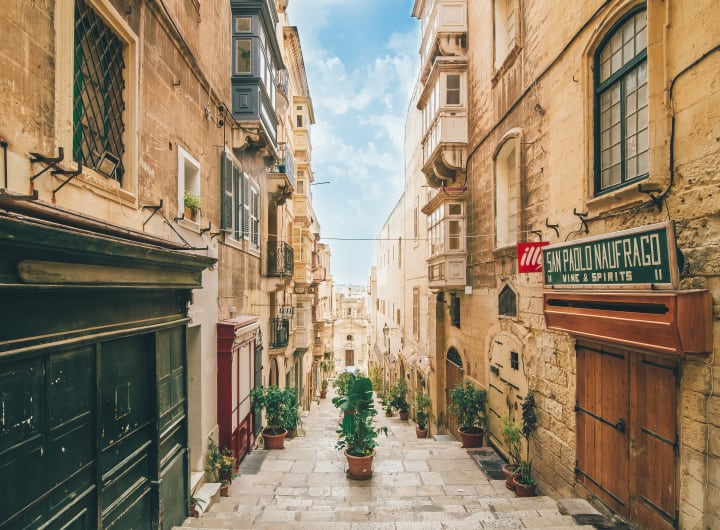
People often overlook the tiny mediterranean island of Malta when considering a new home abroad. What sort of career path could such a tiny island (with a population of just half a million), located between Sicily and Tunisia, possibly have to offer compared to culture capitals such as Milan?
Hear me out. Firstly, English is one of two official languages (the other being Maltese), meaning that for those of you who struggle with learning a new language, this may be an excellent choice. Secondly, there is no property tax for things such as property maintenance! Thirdly, Malta can boast one of the lowest unemployment rates in Europe, at just 3.4% as of 2019, and it is not necessary to secure employment before applying for a work visa. Game development, online gambling and financial tech are all booming industries in Malta, while the tourism sector, particular the yachting industry, are a common sources for expats, though this is often seasonal work.
Despite being an island, Malta's position in the middle of the Mediterranean sea puts it at close proximity to several countries across both Europe and North Africa. Plenty of flight or ferry options for anyone worried about feeling cut off from the world while living on an island.
For keen celebrity-spotters, the film industry is a surprisingly big factor to Malta's economy, with its picturesque architecture and landscapes often standing in for Ancient Greece, Rome, and the Middle East. Films including Troy, World War Z and Gladiator have all been filmed in Malta, and so, sure, you may have seen Benedict Cumberbatch on the London underground that one time, but there's always a chance of spotting Brad Pitt filming his latest blockbuster right in your neighbourhood.
Monthly minimum wage: €747
Average monthly net salary (after tax): €1,046.39
Average monthly rent (1 bedroom, central apartment): €963.64
Price of property per square metre: €4,050
Average basic monthly utility bills: €82.64
Public transport (one way ticket): €1.50
Price of a loaf of bread: €0.82
Price of a litre of milk: €0.99
Price of a half litre of beer: €3
Granada, Spain
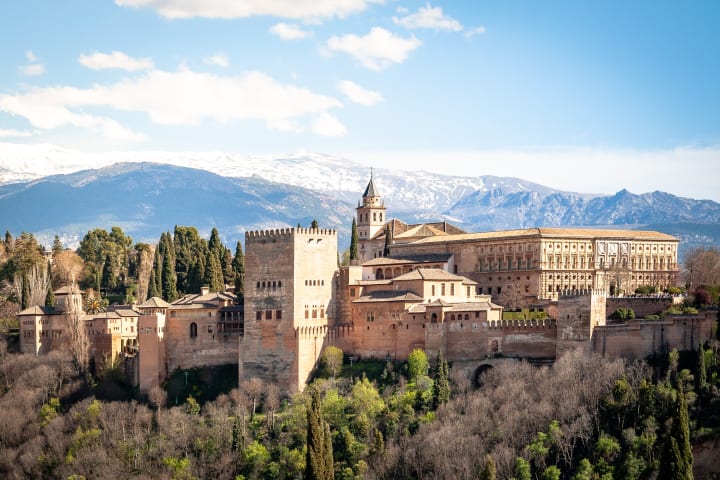
Of all the cities in Spain, why Granada, I hear you say? Having lived in both Madrid and Barcelona, I've loved both cities equally, and yet have watched prices steadily rise over the years. As people flock in droves to Spain's two largest and most well-known cities, look instead to calmer, smaller Granada.
Geographically, the landscape surrounding Granada is broad enough to satisfy anyone, from mountains to beaches, valleys to forests. In a single day, it's possible to go skiing in the mountains and snorkelling in the sea. Hiking, canyoning, mountain climbing and scuba diving are all possible sports just a short distance from this small city.
Living costs are extremely affordable, with a one bedroom, central apartment costing between €300-600 per month, eating out is cheap due to the city's tradition of serving a free tapas with every drink, while a meal in a restaurant will cost about €10. Siesta is still very much a tradition in Granada, with it being typical to take a two hour lunch break, and there is a strong emphasis on family and social life, making for a much more balanced lifestyle than you would find in a big city.
However, English is not broadly spoken in Granada, so be prepared to learn a fair amount of Spanish if you wish to stay, and like many smaller cities, the culture is much less diverse and multicultural than someone moving from a capital city might be used to.
EU citizens are able to study at university in Spain for free, and the University of Granada is the 14th best and one of the largest universities in Spain. Tourism is the largest contributor to employment, with plenty of full-time and seasonal work in nearby, including at ski resorts and scuba diving spots, while agriculture and fishing also greatly boost the local economy.
Monthly minimum wage: €1,050
Average monthly net salary (after tax): €1,185.71
Average monthly rent (1 bedroom, central apartment): €499.25
Price of property per square metre: €2,330
Average basic monthly utility bills: €123.05
Public transport (one way ticket): €1.40
Price of a loaf of bread: €0.88
Price of a litre of milk: €0.84
Price of a half litre of beer: €2.50
Edinburgh, Scotland
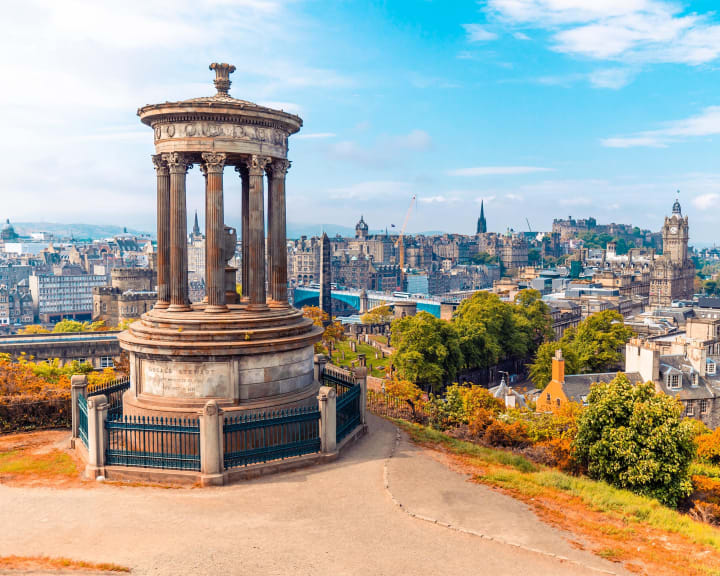
Being one of the more expensive cities on this list (if not the most expensive), bear with me while I explain why the Scottish capital still deserves a place upon this list, when affordable living costs have so far been such a key factor during consideration.
Firstly, the obvious: for English-speakers, there is no need to learn a second language in order to settle easily into Edinburgh. Having in 2018 been voted the best city in the world to live, the city can make claims of a low crime rate and high levels and quality of education (Edinburgh University being the 30th highest ranking university in the world).
For culture lovers, Fringe festival is the biggest cultural festival, globally, drawing artists, actors, musicians and comedians to perform from around the world, while Harry Potter fans will find in Edinburgh's cobbled streets the real-life inspiration for locations such as Diagon alley, the Riddles' graves and of course, Hogwarts, not to mention that JK Rowling wrote the first novel in a local cafe? Oh, and that she still calls Edinburgh home. Voted the fourth most beautiful city in 2016 (after Paris, Florence and Rome), the city's narrow streets are teeming with history, with gems including Edinburgh Castle, the Palace of Holyroodhouse and Calton Hill, as well as countless museums and art galleries.
If you prefer life outdoors, Edinburgh is surrounded by beautiful lochs and beautiful hilly landscapes, most famously, Arthur's Seat, providing plenty of opportunities for hikes and day trips.
Besides London, Edinburgh has the strongest economy in the UK, with plenty of jobs available in finance, tech, healthcare, education and tourism.
Monthly minimum wage: £1,441/€1,700
Average monthly net salary (after tax): £1,854.88/€2,182.81
Average monthly rent (1 bedroom, central apartment): £782.62/€920.98
Price of property per square metre: £4,106.41/€4,832.41
Average basic monthly utility bills: £139.64/€164.32
Public transport (one way ticket): £1.70/€2
Price of a loaf of bread: £0.88/€1.04
Price of a litre of milk: £0.88/€1.04
Price of a half litre of beer: £4/€4.72
Berlin, Germany
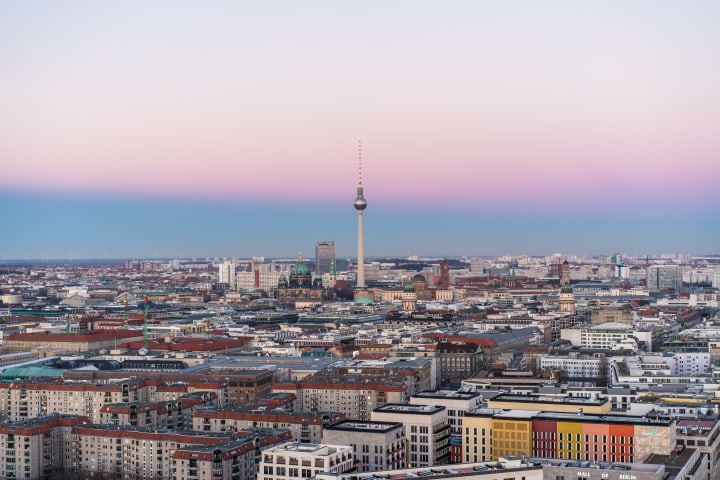
Considering that Berlin is one of my most important and prominent cities in the European Union, being the capital of one of the bloc's wealthiest members, it remains to this day surprisingly affordable, and yet rich with opportunity.
As one of the top startup capitals in the world, entrepreneurship is a strong career option in Berlin, and seeking work within a startup is a common job choice for expats, as it grants eligibility for a work visa. The service sector makes up for 84% of Berlin's economy, while Berlin boasts a strong arts scene, and plenty of career opportunities in finance and tech. Germany also offers free university education to EU citizens, with just a small fee required of about €150-250 to cover admin fees.
Germany's minimum monthly wage is the fifth highest in Europe, and yet living costs are comparatively very low, with a cappuccino costing just €2.70 and a half litre of beer in the pub just €3.50, while dinner at a restaurant will cost about €10.
Being one of Europe's most diverse and tolerant cities, many locals speak English, (though learning some German is advised) and one in five residents can claim a migrant heritage. Thousands of expats calling home, making for a strong, international community.
The nightlight in Berlin is world famous, it being a centre for electronic music, and the city can boast some of the best clubs in the world. Weekends and day trips away are easy to arrange given Germany's central position within Europe. With countless trains and flights travelling to dozens of countries, you can travel almost anywhere on the continent at very little cost.
Monthly minimum wage: €1,599
Average monthly net salary (after tax): €2,301.72
Average monthly rent (1 bedroom, central apartment): €903.09
Price of property per square metre: €5,938.24
Average basic monthly utility bills: €230.24
Public transport (one way ticket): €2.80
Price of a loaf of bread: €1.28
Price of a litre of milk: €0.81
Price of a half litre of beer: €3.50
Rotterdam, Netherlands
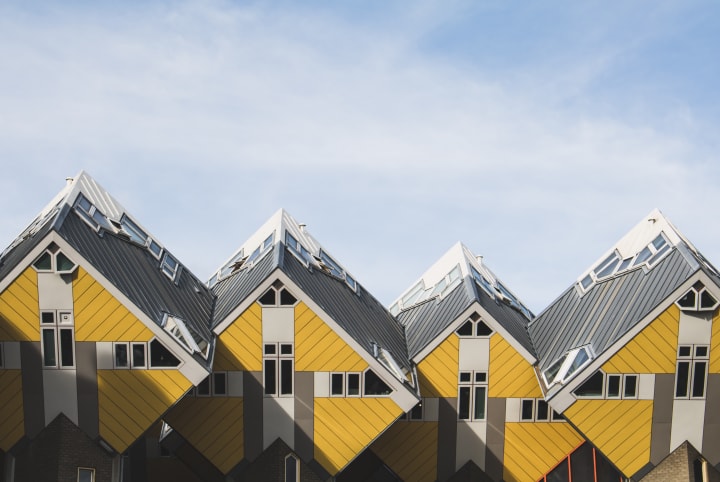
Rotterdam is definitely on of the more architecturally unique cities in Europe, if not the world, with its famous cubic houses, it makes for quite a sight! For the past decade or so, people have been flocking to this up-and-coming city, and its cultural scene, art scene, food and music scenes are thriving. An excellent city for young people, Rotterdam's annual calendar is filled with festivals and events.
The city also has one of the largest harbours in the world, making it an excellent place for anyone looking to work on yachts or cruise ships. Cycling is a huge part of Dutch culture, with big, safe bike lanes making the switch from car to bike an easy, if not pretty obvious choice. And for runners, there are also plenty of running routes marked out clearly across the city!
90% of the Dutch population speak English, removing any pressure of a language barrier, though naturally learning some Dutch is always useful. Rotterdam is a very industrial city, the port being one of the biggest employers, while the city is also the site of several energy companies, as well as chemical and food companies. As with all of these cities, however, a number of expats work as freelancers, particularly working in tech, consultation and design.
Monthly minimum wage: €1,615.80
Average monthly net salary (after tax): €2,308.81
Average monthly rent (1 bedroom, central apartment): €1,098
Price of property per square metre: €3,606.15
Average basic monthly utility bills: €153.40
Public transport (one way ticket): €4
Price of a loaf of bread: €1.14
Price of a litre of milk: €0.90
Price of a half litre of beer: €4
Ljubljana, Slovenia
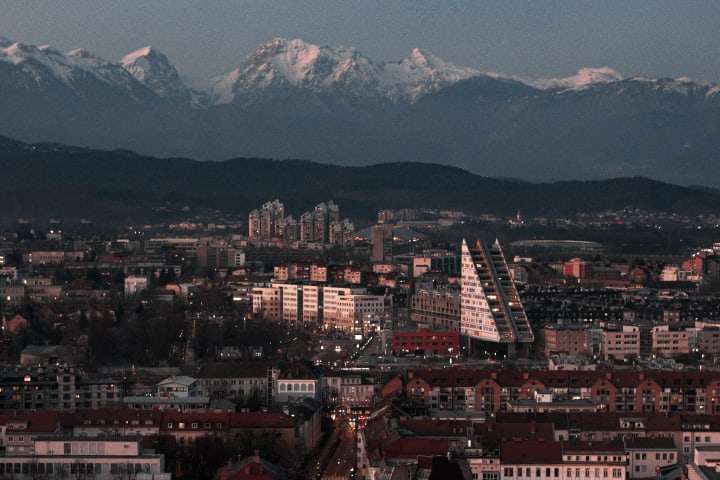
Another lesser known city rounds up our list, few think of Slovenia when considering a new home abroad, and yet Ljubljana has long been a hidden gem, especially for those looking to retire abroad.
Ljubljana is the perfect city for outdoorsy types, with plenty of opportunities to indulge in cycling, climbing, hiking, kayaking, rafting, and even skiing. With the coast just an hours drive away, a day trip to the beach is easily achievable. A relaxed way of life is a huge part of the culture, friendly, welcoming locals spend their time socialising in bars along the river, or in the city's many green spaces. The younger generation all speak excellent English, making the language barrier much easier to navigate.
Over 10,000 events take place in the city each year, including 10 international festivals in music, theatre and art, and there are dozens of museums and galleries in the city for those in need of culture.
The Ljubljana Stock Exchange and the industry sector are the largest contributors towards the economy, while finance, transport, construction, service and tourism also make up much of the economy. Many expats work freelance, particularly in tech and IT.
With a low crime rate and low living costs, Ljubljana is an excellent choice if you're looking to think outside of the box when choosing the next city to call home.
Monthly minimum wage: €940
Average monthly net salary (after tax): €1,162.69
Average monthly rent (1 bedroom, central apartment): €582.72
Price of property per square metre: €3,627.78
Average basic monthly utility bills: €199.05
Public transport (one way ticket): €1.30
Price of a loaf of bread: €1.06
Price of a litre of milk: €0.91
Price of a half litre of beer: €2.60
All information regarding living costs were sourced via Numbeo, an amazing site for anyone looking to travel or move abroad.
About the Creator
Emma Styles
Flâneuse. Part-time Parisian. Ocean lover.


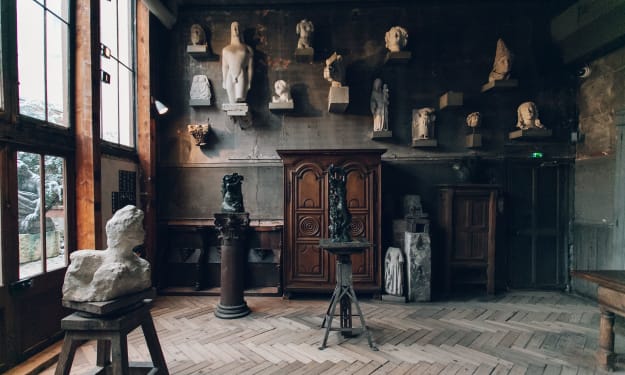

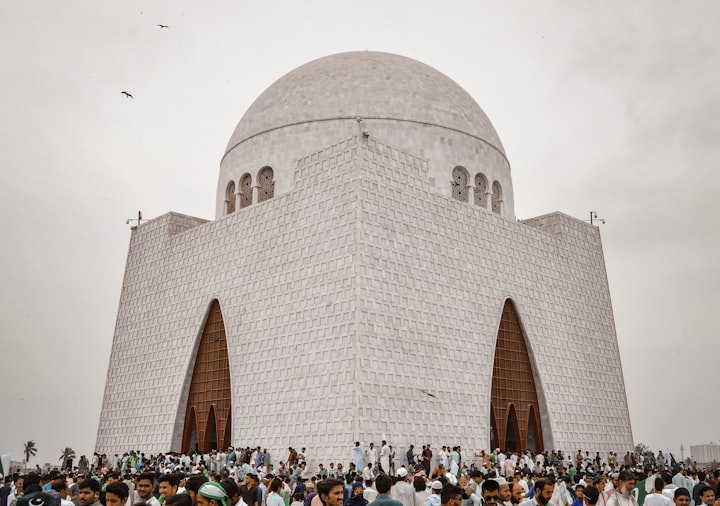

Comments
There are no comments for this story
Be the first to respond and start the conversation.